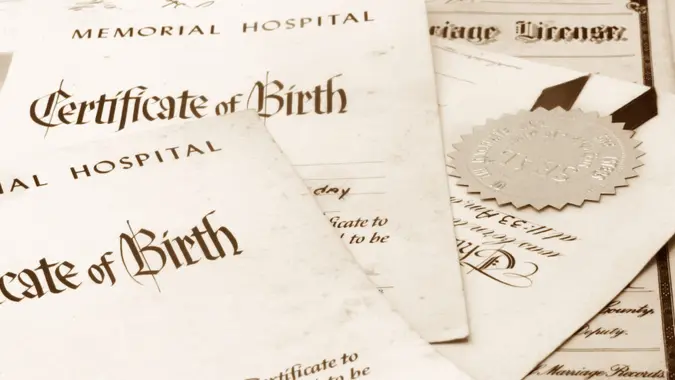10 Financial Documents You Should Never Get Rid Of — and How It Could Cost You If You Do

Commitment to Our Readers
GOBankingRates' editorial team is committed to bringing you unbiased reviews and information. We use data-driven methodologies to evaluate financial products and services - our reviews and ratings are not influenced by advertisers. You can read more about our editorial guidelines and our products and services review methodology.

20 Years
Helping You Live Richer

Reviewed
by Experts

Trusted by
Millions of Readers
As you get older, there are so many documents to keep track of. Official government documents, IDs, bank statements, bills, and other important notices can pile up fast.
It can be a struggle to keep everything organized and identify which documents are the most important to preserve. If you’re unsure, there are 10 specific financial and personal documents you must keep forever.
10 Financial Documents That You Should Never Throw Away
Here are 10 financial and personal documents that you should never get rid of, according to The Washington Post:
- Birth certificates and adoption papers.
- Death certificates.
- Funeral programs.
- Estate documents, including your will and power of attorney documents.
- Marriage and divorce records.
- Year-end pay stubs.
- Social Security cards.
- Military service records, including discharge documents.
- Retirement or pension records.
- Loan payoff statements.
If you have financial and personal records and you aren’t sure how long you should keep them, it’s best to err on the side of caution and keep them as long as possible.
Additional Important Documents and How Long You Should Keep Them
For all other important financial documents, here’s how long you should keep them, according to The Washington Post and Forbes:
Less than a year
- Insurance claims forms.
- Documents about products under warranty.
- ATM receipts.
- Retail purchase receipts.
One year
- Receipts for major purchases.
- Pay stubs.
- Investment accounts statements.
- Non-tax-related credit card and bank statements.
- Paid medical bills.
Three to seven years (or more)
- Your previous tax returns.
- Receipts or canceled checks that support tax deductions against your income.
- Medical bills that were paid with an FSA or HSA spending account.
Generally, documents related to income, taxes, and tax-related expenses should be preserved the longest. You don’t want to be audited or otherwise scrutinized by the IRS and lack the necessary documents to defend yourself.
What Happens If You Get Rid Of Important Financial Documents?
There are several consequences to consider if you end up disposing of important financial and personal documents:
- You may have to spend a significant amount of time and money to get new copies.
- You may not have enough proof of identity.
- You may not have proof that you paid an important bill or satisfied a significant debt.
- You could be at risk of identity theft or fraud if your documents aren’t disposed of properly.
When in doubt, retain your documents indefinitely. You don’t want to be caught without an important document that you may need at some point in the future.
If you’re sure you can dispose of a particular document, be sure to take careful measures when throwing it away, such as using a shredding machine. Don’t just take it and throw it in your kitchen trash bin.
How To Store Important Financial Records
Here’s how to best store your financial and personal records:
- Paper storage, using a filing cabinet, folders, or another type of document organizer.
- A physical hard drive.
- Cloud storage, such as Dropbox or Google Drive.
Whichever method you choose, be sure to have backups of everything in case you lose physical copies or lose access to your digital storage.
 Written by
Written by  Edited by
Edited by 

























